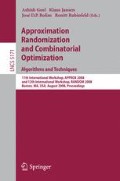Abstract
In this paper, we propose a general framework for designing fully polynomial time approximation schemes for combinatorial optimization problems, in which more than one objective function are combined into one using any norm. The main idea is to exploit the approximate Pareto-optimal frontier for multi-criteria optimization problems. Using this approach, we obtain an FPTAS for a novel resource allocation problem, for the problem of scheduling jobs on unrelated parallel machines, and for the Santa Claus problem, when the number of agents/machines is fixed, for any norm, including the l ∞ -norm. Moreover, either FPTAS can be implemented in a manner so that the space requirements are polynomial in all input parameters. We also give approximation algorithms and hardness results for the resource allocation problem when the number of agents is not fixed.
Access this chapter
Tax calculation will be finalised at checkout
Purchases are for personal use only
Preview
Unable to display preview. Download preview PDF.
References
Laudon, J., Lenoski, D.: The SGI origin: A ccNUMA highly scalable server. In: Proceedings of the 24th International Symposium on Computer Architecture, Boulder, CO, pp. 241–251 (1997)
Horowitz, E., Sahni, S.: Exact and approximate algorithms for scheduling nonidentical processors. Journal of the ACM 23, 317–327 (1976)
Lenstra, J.K., Shmoys, D.B., Tardos, É.: Approximation algorithms for scheduling unrelated parallel machines. Mathematical Programming 46, 259–271 (1990)
Hochbaum, D.S., Shmoys, D.B.: Using dual approximation algorithms for scheduling problems: Theoretical and practical results. Journal of the ACM 34, 144–162 (1987)
Woeginger, G.J.: When does a dynamic programming formulation guarantee the existence of a fully polynomial time approximation scheme (FPTAS)? INFORMS Journal on Computing 12, 57–74 (2000)
Safer, H.M., Orlin, J.B., Dror, M.: Fully polynomial approximation in multi-criteria combinatorial optimization. Technical report, Operations Research Center, MIT (2004)
Safer, H.M., Orlin, J.B.: Fast approximation schemes for multi-criteria combinatorial optimzation. Technical report, Operations Research Center, MIT (1995)
Safer, H.M., Orlin, J.B.: Fast approximation schemes for multi-criteria flow, knapsack, and scheduling problems. Technical report, Operations Research Center, MIT (1995)
Papadimitriou, C.H., Yannakakis, M.: On the approximability of trade-offs and optimal access of web sources. In: Proceedings of the 41st Annual IEEE Symposium on Foundations of Computer Science, Redondo Beach, CA, pp. 86–92 (2000)
Bansal, N., Sviridenko, M.: The Santa Claus problem. In: Proceedings of the 38th Annual ACM Symposium on Theory of Computing, Seattle, WA, pp. 31–40 (2006)
Lipton, R.J., Markakis, E., Mossel, E., Saberi, A.: On approximately fair allocations of indivisible goods. In: Proceedings of the 5th ACM Conference on Electronic Commerce, New York, NY, pp. 125–131 (2004)
Bezàkovà, I., Dani, V.: Allocating indivisible goods. ACM SIGecom Exchanges 5, 11–18 (2005)
Azar, Y., Epstein, L., Richter, Y., Woeginger, G.J.: All-norm approximation algorithms. Journal of Algorithms 52, 120–133 (2004)
Hansen, P.: Bicriterion path problems. In: Fandel, G., Gál, T. (eds.) Multiple Criteria Decision Making: Theory and Application. Lecture Notes in Economics and Mathematical Systems, vol. 177, pp. 109–127. Springer, Heidelberg (1980)
Grötschel, M., Lovász, L., Schrijver, A.: Geometric Algorithms and Combinatorial Optimization. Springer, Berlin (1988)
Garey, M.R., Johnson, D.S.: Computers and Intractability: A Guide to the Theory of NP-completeness. W. H. Freeman, New York (1979)
Author information
Authors and Affiliations
Editor information
Rights and permissions
Copyright information
© 2008 Springer-Verlag Berlin Heidelberg
About this paper
Cite this paper
Mittal, S., Schulz, A.S. (2008). A General Framework for Designing Approximation Schemes for Combinatorial Optimization Problems with Many Objectives Combined into One. In: Goel, A., Jansen, K., Rolim, J.D.P., Rubinfeld, R. (eds) Approximation, Randomization and Combinatorial Optimization. Algorithms and Techniques. APPROX RANDOM 2008 2008. Lecture Notes in Computer Science, vol 5171. Springer, Berlin, Heidelberg. https://doi.org/10.1007/978-3-540-85363-3_15
Download citation
DOI: https://doi.org/10.1007/978-3-540-85363-3_15
Publisher Name: Springer, Berlin, Heidelberg
Print ISBN: 978-3-540-85362-6
Online ISBN: 978-3-540-85363-3
eBook Packages: Computer ScienceComputer Science (R0)

